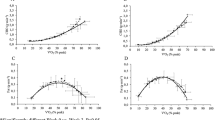Abstract
To investigate the effects of 8-weeks of full versus split body resistance training (RT) on appetite and energy intake in non-obese untrained men. The participants were pair-matched based on their initial fat mass and then randomly allocated into one of two treatment groups: Full body (FB, n = 20), in which all muscle groups were trained in every session, or Split body (SB, n = 15), in which upper and lower muscle groups were trained alternated per session; both groups trained in non-consecutive days, three times per week with total number of sets performed equated between groups. Energy intake, body composition, and strength performance were evaluated at pre-training, and after 8-weeks of RT, as well as self-reported hunger, fullness, and desire to eat, that were assessed at fasted and feed states pre- and post-intervention. FB and SB resistance training increased fat-free mass (FFM) (p < 0.001); and FB induced greater maximal strength improvement (p = 0.027). At fasted state self-reported hunger increased, and fullness decreased, while in feed state desire to eat something fatty increased in both groups. Carbohydrate intake (p = 0.011) decreased in both groups. In conclusion, FB and SB training increased orexigenic drive (increasing hunger and decreasing fullness), however, total energy intake and fat mass did not change after 8-weeks of RT in non-obese untrained men.
Registered under Brazilian Registry of Clinical Trials no. RBR-3wkcvyw.
This is a preview of subscription content, access via your institution
Access options
Subscribe to this journal
Receive 12 print issues and online access
$259.00 per year
only $21.58 per issue
Buy this article
- Purchase on Springer Link
- Instant access to full article PDF
Prices may be subject to local taxes which are calculated during checkout

Similar content being viewed by others
References
Oppert JM, Bellicha A, van Baak MA, Battista F, Beaulieu K, Blundell JE, et al. Exercise training in the management of overweight and obesity in adults: synthesis of the evidence and recommendations from the European Association for the Study of Obesity Physical Activity Working Group. Obes Rev. 2021;22:e13273. https://doi.org/10.1111/obr.13273.
Panissa VL, Cardoso LK, Rossi PA, Fukuda DH, Rossi FE. The impact of acute and chronic resistance training on appetite and energy intake: a scoping review examining resistance exercise and comparisons with other exercise modalities. Appetite. 2024;1:107155. https://doi.org/10.1016/j.appet.2023.107155.
Freitas MC, Ricci-Vitor AL, de Oliveira J, Quizzini GH, Vanderlei LCM, Silva BSA, et al. Appetite is suppressed after full-body resistance exercise compared with split-body resistance exercise: the potential influence of lactate and autonomic modulation. J Strength Cond Res. 2021;35:2532–40. https://doi.org/10.1519/jsc.0000000000003192.
Flint A, Raben A, Blundell JE, Astrup A. Reproducibility, power and validity of visual analogue scales in assessment of appetite sensations in single test meal studies. Int J Obes Relat Metab Disord. 2000;24:38–48. https://doi.org/10.1038/sj.ijo.0801083.
Lichtenstein AH, Appel LJ, Brands M, Carnethon M, Daniels S, Franch HA, et al. Diet and lifestyle recommendations revision 2006: a scientific statement from the American Heart Association Nutrition Committee. Circulation. 2006;114:82–96.
Blundell JE, Finlayson G, Gibbons C, Caudwell P, Hopkins M. The biology of appetite control: do resting metabolic rate and fat-free mass drive energy intake? Expert Rev Endocrinol Metab. 2015;152:473–8. https://doi.org/10.1016/j.physbeh.2015.05.031.
Hopkins M, Gibbons C, Blundell J. Fat-free mass and resting metabolic rate are determinants of energy intake: implications for a theory of appetite control. Philos Trans R Soc B. 2023;378:20220213.
Halliday TM, Davy BM, Clark AG, Baugh ME, Hedrick VE, Marinik EL, et al. Dietary intake modification in response to a participation in a resistance training program for sedentary older adults with prediabetes: Findings from the Resist Diabetes study. Eat Behav. 2014;15:379–82.
Halliday TM, Legget KT, Hild AK, Tregellas JR, Melanson EL, Cornier MA. Aerobic exercise training increases dietary restraint and reduces hunger and energy intake in overweight/obese adults: 3050 June 2 3. Med Sci Sports Exerc. 2017;49:864–5.
Acknowledgements
Fabricio Eduardo Rossi would like to thank Conselho Nacional de Desenvolvimento Científico e Tecnológico-CNPq (Funding validity by March/2023 to March/2026) for their support. Valéria LG Panissa was supported by CAPES/PRINT (process number 88887.716953/2022-00 and 88887.839151/2023-00).
Author information
Authors and Affiliations
Contributions
Conceptualization, VLGP, JMC and FER; methodology, LKC, NLS, ASB, CAB, EMLB, RCM, PAM, PAQR, MMV, AKAB AND JPJS; FER performed the statistical analyses. Writing-review and editing, LKC, JMC, VLGP, NEZ, FER; All authors have read and agreed to the published version of the manuscript.
Corresponding author
Ethics declarations
Competing interests
The authors declare no competing interests.
Additional information
Publisher’s note Springer Nature remains neutral with regard to jurisdictional claims in published maps and institutional affiliations.
Rights and permissions
Springer Nature or its licensor (e.g. a society or other partner) holds exclusive rights to this article under a publishing agreement with the author(s) or other rightsholder(s); author self-archiving of the accepted manuscript version of this article is solely governed by the terms of such publishing agreement and applicable law.
About this article
Cite this article
Cardoso, L.K., Panissa, V.L.G., Cholewa, J.M. et al. Comparison of 8-weeks of full versus split body resistance training on appetite and energy intake in non-obese untrained men. Eur J Clin Nutr (2024). https://doi.org/10.1038/s41430-024-01432-w
Received:
Revised:
Accepted:
Published:
DOI: https://doi.org/10.1038/s41430-024-01432-w



